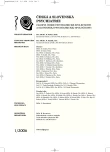-
Medical journals
- Career
Pharmacotherapy for Cognitive Dysfunction in Schizophrenia
Authors: E. Češková; H. Kučerová; T. Kašpárek; R. Přikryl
Authors‘ workplace: Psychiatrická klinika LF MU a FN, Brno přednosta prof. MUDr. E. Češková, CSc.
Published in: Čes. a slov. Psychiat., 102, 2006, No. 1, pp. 13-17.
Category: Comprehensive Reports
Overview
Cognitive dysfunction is found in many neuropsychiatric disorders. It becomes the centre of attention for many reasons, mainly because it is a very important factor influencing the functioning of the patients. The cognitive dysfunction involves several components, which are associated with a certain anatomical and functional substrate. Most studies were performed in patients with schizophrenia. The available pharmacotherapeutic possibilities include atypical antipsychotics and adjunctive treatment, which can further augment the effect of atypicals. The atypicals differ by their pharmacological profile, and this is also reflected in the differentiated effects on individual components. In comparison with typicals, atypical antipsychotics improve cognitive dysfunction more. The augmentation of basal neurotransmitters related to cognitive dysfunction (noradrenaline, acetylcholine, glutamate) and serotonin receptor modulators are studied. The cholinergic augmentation is primarily studied in dementia.
Key words:
cognitive dysfunction, first-episode schizophrenia, atypical antipsychotics, adjunctive treatment, augmentation.
Labels
Addictology Paediatric psychiatry Psychiatry
Article was published inCzech and Slovak Psychiatry

2006 Issue 1
Most read in this issue- Parental Alienation Syndrome
- Childhood Autism: A Research Update
- Pharmacotherapy for Cognitive Dysfunction in Schizophrenia
- Sexual Aggression in Women
Login#ADS_BOTTOM_SCRIPTS#Forgotten passwordEnter the email address that you registered with. We will send you instructions on how to set a new password.
- Career

